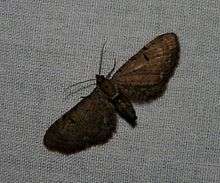Eupithecia miserulata
Eupithecia miserulata, the common eupithecia, is a moth of the family Geometridae. The species was first described by Augustus Radcliffe Grote in 1863 and it can be found in North America, from Ontario and Maine in the north to Florida, Mississippi, Louisiana and Texas in the south. It is also found in Arizona and California.[2]
Caterpillar
| Eupithecia miserulata | |
|---|---|
 | |
| Scientific classification | |
| Kingdom: | Animalia |
| Phylum: | Arthropoda |
| Class: | Insecta |
| Order: | Lepidoptera |
| Family: | Geometridae |
| Genus: | Eupithecia |
| Species: | E. miserulata |
| Binomial name | |
| Eupithecia miserulata | |
| Synonyms | |
| |
The wingspan is 12–20 mm. The forewings are grayish to grayish brown. The hindwings are the same color, but have a small discal spot and a variably represented an extradiscal line. The moths flies from March to November depending on the location.
The larvae feed on a wide range of plants, including coneflower, asters, willows, cherry, juniper and clover.
Subspecies
- Eupithecia miserulata miserulata (most of eastern North America)
- Eupithecia miserulata vitans Schaus, 1913
- Eupithecia miserulata zela Swett & Cassino, 1919 (California)
gollark: To confuse everyone, how about writing binary lamba calculus with λs and .s?
gollark: `λ λ. λ` <- extra lambdaas
gollark: 5.
gollark: Because```:: (Stencil sh a stencil, Elt b) => (stencil -> Exp b) stencil function-> Boundary (Array sh a) boundary condition-> Acc (Array sh a) source array-> Acc (Array sh b) destination array```
gollark: *clearly
References
- Yu, Dicky Sick Ki. "Eupithecia miserulata Grote 1863". Home of Ichneumonoidea. Taxapad. Archived from the original on March 24, 2016.
- Rindge, Frederick H. (February 19, 1985). "The Eupithecia (Lepidoptera, Geometridae) of Mississippi and Louisiana" (PDF). American Museum Novitates (2809): 1–18.
| Wikimedia Commons has media related to Eupithecia miserulata. |
| Wikispecies has information related to Eupithecia miserulata |
External links
- McLeod, Robin (March 1, 2019). "Species Eupithecia miserulata - Common Eupithecia - Hodges#7474". BugGuide. Retrieved March 3, 2019.
This article is issued from Wikipedia. The text is licensed under Creative Commons - Attribution - Sharealike. Additional terms may apply for the media files.